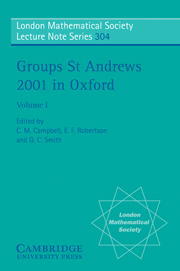Book contents
- Frontmatter
- Contents
- Contents of Volume 2
- Introduction
- Permutability and subnormality in finite groups
- (Pro)-finite and (topologically) locally finite groups with a CC-subgroup
- Table algebras generated by elements of small degrees
- Subgroups which are a union of a given number of conjugacy classes
- Some results on finite factorized groups
- On nilpotent-like Fitting formations
- Locally finite groups with min-p for all primes p
- Quasi-permutation representations of 2-groups of class 2 with cyclic centre
- Groups acting on bordered Klein surfaces with maximal symmetry
- Breaking points in subgroup lattices
- Group actions on graphs, maps and surfaces with maximum symmetry
- On dual pronormal subgroups and Fitting classes
- (p, q, r)-generations of the sporadic group O'N
- Computations with almost-crystallographic groups
- Random walks on groups: characters and geometry
- On distances of 2-groups and 3-groups
- Zeta functions of groups: the quest for order versus the flight from ennui
- Some factorizations involving hypercentrally embedded subgroups in finite soluble groups
- Elementary theory of groups
- Andrews-Curtis and Todd-Coxeter proof words
- Short balanced presentations of perfect groups
- Finite p-extensions of free pro-p groups
- Elements and groups of finite length
- Logged rewriting and identities among relators
- A characterization of F4(q) where q is an odd prime power
- On associated groups of rings
Elementary theory of groups
Published online by Cambridge University Press: 11 January 2010
- Frontmatter
- Contents
- Contents of Volume 2
- Introduction
- Permutability and subnormality in finite groups
- (Pro)-finite and (topologically) locally finite groups with a CC-subgroup
- Table algebras generated by elements of small degrees
- Subgroups which are a union of a given number of conjugacy classes
- Some results on finite factorized groups
- On nilpotent-like Fitting formations
- Locally finite groups with min-p for all primes p
- Quasi-permutation representations of 2-groups of class 2 with cyclic centre
- Groups acting on bordered Klein surfaces with maximal symmetry
- Breaking points in subgroup lattices
- Group actions on graphs, maps and surfaces with maximum symmetry
- On dual pronormal subgroups and Fitting classes
- (p, q, r)-generations of the sporadic group O'N
- Computations with almost-crystallographic groups
- Random walks on groups: characters and geometry
- On distances of 2-groups and 3-groups
- Zeta functions of groups: the quest for order versus the flight from ennui
- Some factorizations involving hypercentrally embedded subgroups in finite soluble groups
- Elementary theory of groups
- Andrews-Curtis and Todd-Coxeter proof words
- Short balanced presentations of perfect groups
- Finite p-extensions of free pro-p groups
- Elements and groups of finite length
- Logged rewriting and identities among relators
- A characterization of F4(q) where q is an odd prime power
- On associated groups of rings
Summary
Abstract
Remarkable ties between group theory, logic and algebraic geometry have come to light via the positive solution of the Tarski conjecture. This has led to further work on the universal theory of groups. In this paper we describe and survey this material a large body of which is not familiar to most group theorists
Contents
Introduction.
First Order Languages and Model Theory.
The Tarksi Problems.
Residually Free and Universally Free Groups.
Algebraic Geometry over Groups and Applications.
The Positive Solution to the Tarski Problems.
Discriminating, Co-discriminating and Squarelike Groups.
Open Questions.
Introduction
The elementary theory of a group G consists of all the first-order or elementary sentences (see section 2) which are true in G. Although this is a concept which originated in formal logic, in particular model theory, it arises independently from the theory of equations within groups. Recall that an equation in a group G is a word W(x1,…, xn, g1,…, gk) in free variables x1,…, xn and constants g1,…, gk which are elements of G. A solution consists of an n-tuple (h1,…, hn) of elements from G which upon substitution for x1,…, xn make the word trivial in G. Hence an equation is a first-order sentence in the language L[G] consisting of the elementary language of group theory (again see section 2) augmented by allowing constants from the group G.
- Type
- Chapter
- Information
- Groups St Andrews 2001 in Oxford , pp. 197 - 231Publisher: Cambridge University PressPrint publication year: 2003

